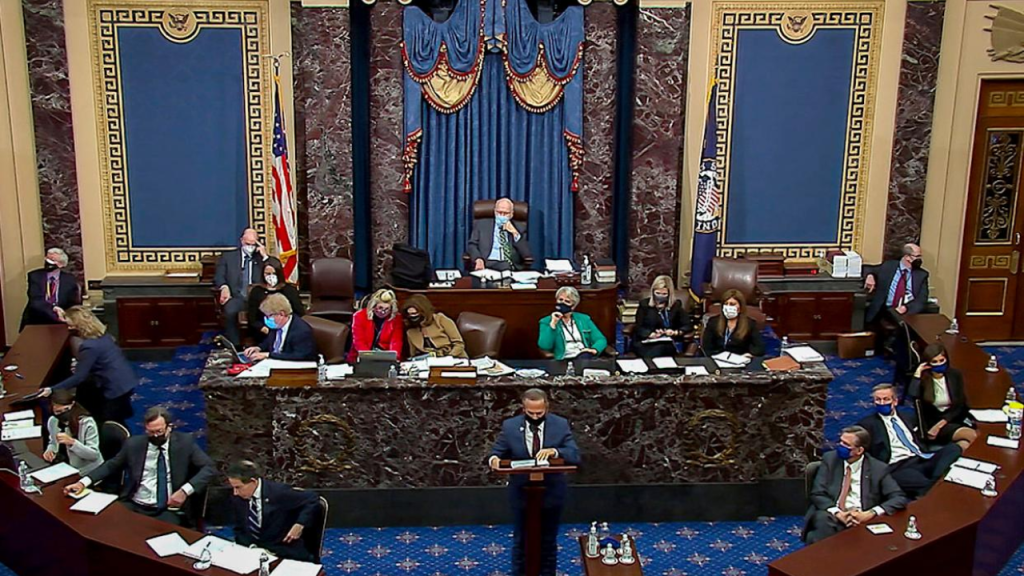
Since January 20, there’s been growing talk of a constitutional crisis—a president acting as if he’s above the law, trying to rule like a king in everything but name.
Yet despite this, most elected Democrats have carefully avoided using one specific word. Their warnings ring hollow when they refuse to say what’s becoming painfully obvious.
It’s time to stop dancing around it: Donald Trump must be impeached and removed from office.
A handful of members of Congress have dared to say so out loud. That’s a start. But to break the silence, public pressure is critical—and more powerful than many realize.
A grassroots volunteer movement called “Operation Anti-King” has begun organizing in every congressional district, directly contacting lawmakers.
Alongside Rep. Al Green of Texas, who has consistently called for impeachment since Trump’s first term, they’ve already found seven others who are willing to go on record: Reps. Suzanne Bonamici and Maxine Dexter from Oregon, Sam Liccardo and Maxine Waters from California, Ilhan Omar from Minnesota, Shri Thanedar from Michigan, and Hank Johnson from Georgia.
In a statement to the group, Rep. Dexter drew a clear line: “Donald Trump’s cruel, chaotic, and unlawful actions have put our democracy at risk. I will not stand by while our democracy is eroded.
I support impeachment because no one is above the law.” Bonamici added that Trump is “violating the Constitutional rights of people in this country and ignoring the rule of law.”
Some argue against impeachment with familiar objections, but none of them hold water.
The fear that impeachment would backfire politically doesn’t match reality. After Trump’s first impeachment, Democrats went on to win control of the presidency and both chambers of Congress.
After the second, they performed better than expected in the 2022 midterms, even with an unpopular Democratic president. And the claim that it’s “too soon” since the last election? That implies any president can attack the Constitution with impunity as long as they do it quickly.
Meanwhile, Trump’s approval ratings are dropping, especially after his disastrous tariff decisions threatened the economy. Across the country, mass protests are drawing millions.
It’s naive to assume Trump’s public support is fixed. The crisis will escalate, not stabilize. And as the country edges closer to authoritarianism and economic chaos, we need more than just business-as-usual opposition.
As MSNBC’s Chris Hayes recently said to Senate Minority Leader Chuck Schumer, Democrats are acting like it’s Mitt Romney in office, not someone unraveling democracy.
Trump cannot be reasoned with or simply tolerated for the next four years. The only way to restore the rule of law is to remove him from power.
Every member of Congress takes an oath to defend the Constitution, not just when it’s popular or when the polls look good. And claiming they can’t act because Republicans won’t join in is just another way of surrendering in advance.
As Alexander Hamilton once wrote, impeachment covers offenses that are “POLITICAL” in nature—threats to society as a whole. That’s why the process belongs to our elected representatives. They’ll be judged by voters and by history for how they choose to use it.
Under House rules, impeachment is considered a “question of the privileges of the House” and must be voted on within two legislative days if introduced.
Speaker Mike Johnson could delay it with procedural maneuvers, but that also requires a full House vote. So any representative, Democrat or Republican, can force the House to take a stand.
Would such a measure pass today? Probably not. Could it gain traction later? Absolutely.

Waiting only makes things worse. Delay breeds doubt, encourages resignation, and allows the constitutional crisis to deepen. But the truth is, just a few hundred people in Congress still have the power—and the duty—to act.
Some might ask, Impeach him for what? Not because the evidence is lacking, but because there’s so much of it.
He’s usurped congressional authority, imposed illegal taxes, created unconstitutional offices, attacked freedom of speech, intimidated opponents, obstructed justice, accepted bribes, threatened allies, and allegedly disappeared people into foreign detention centers. But all of these actions add up to a single, overwhelming charge: tyranny.
That’s the charge outlined in the model resolution promoted by the grassroots campaign. Tyranny—a term with deep historical weight, from ancient Rome to the American Revolution to the fall of fascist regimes after World War II. A leader who seeks absolute power forfeits his legitimacy.
Drawing from the Declaration of Independence, the resolution states that Trump “has demonstrated his character is marked by every act which may define a tyrant.” It’s arguably a more fitting description for Trump than it ever was for King George III.
He openly admires dictators and autocrats. He disrespects the Constitution, sees no limits on his power, and disregards basic rights and laws.
It’s a hard truth, but avoiding it won’t make it go away. Every member of Congress—and every citizen—faces a choice: Trump or the Constitution. We can’t have both.
To defend the Constitution, we must be ready to use its most powerful safeguard: impeachment.
